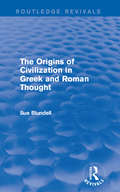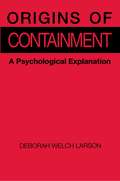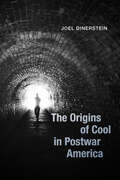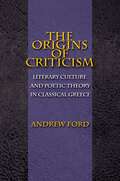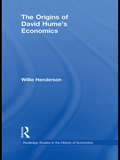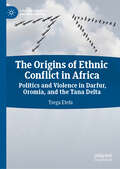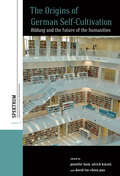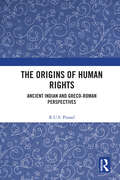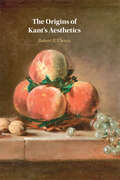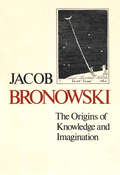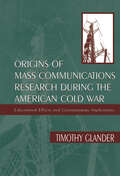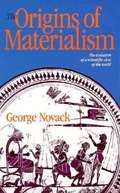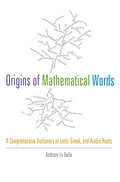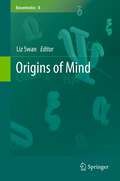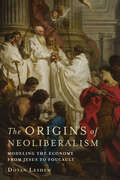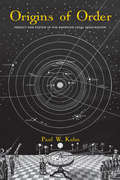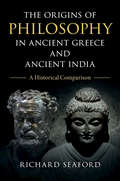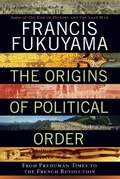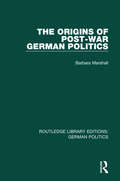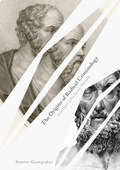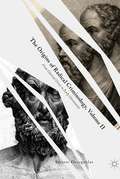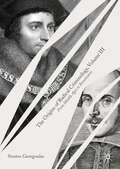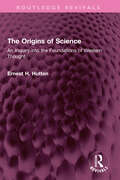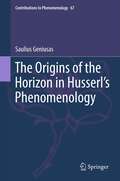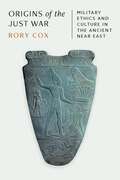- Table View
- List View
The Origins of Civilization in Greek and Roman Thought (Routledge Revivals)
by Sue BlundellIt has been much disputed to what extent thinkers in Greek and Roman antiquity adhered to ideas of evolution and progress in human affairs. Did they lack any conception of process in time, or did they anticipate Darwinian and Lamarckian hypotheses? The Origins of Civilization in Greek and Roman Thought, first published in1986, comprehensively examines this issue. Beginning with creation myths – Mother Earth and Pandora, the anti-progressive ideas of the Golden Age, and the cyclical theories of Orphism – Professor Blundell goes on to explore the origins of scientific speculation among the Pre-Socratics, its development into the teleological science of Aristotle, and the advent of the progressivist views of the Stoics. Attention is also given to the ‘primitivist’ debate, involving ideas about the noble savage and reflections of such speculation in poetry, and finally the relationship between nature and culture in ancient thought is investigated.
Origins of Containment: A Psychological Explanation
by Deborah Welch LarsonThe description for this book, Origins of Containment: A Psychological Explanation, will be forthcoming.
The Origins of Cool in Postwar America
by Joel DinersteinAn “entertaining” study of the enduring concept of coolness, and the mix of cultures and historical events that shaped it (The New York Times).Cool. It was a new word and a new way to be, and in a single generation, it became the supreme compliment of American culture. The Origins of Cool in Postwar America uncovers the hidden history of this concept and its new set of codes that came to define a global attitude and style. As Joel Dinerstein reveals, cool began as a stylish defiance of racism, a challenge to suppressed sexuality, a philosophy of individual rebellion, and a youthful search for social change.Through portraits of iconic figures, he illuminates the cultural connections and artistic innovations among Lester Young, Humphrey Bogart, Robert Mitchum, Billie Holiday, Frank Sinatra, Jack Kerouac, Albert Camus, Marlon Brando, James Dean, and others. We eavesdrop on conversations among Jean-Paul Sartre, Simone de Beauvoir, and Miles Davis, and on a forgotten debate between Lorraine Hansberry and Norman Mailer over the “white Negro” and black cool. We come to understand how the cool worlds of Beat writers and Method actors emerged from the intersections of film noir, jazz, and existentialism. Out of this mix, Dinerstein sketches nuanced definitions of cool that unite concepts from African-American and Euro-American culture: the stylish stoicism of the ethical rebel loner; the relaxed intensity of the improvising jazz musician; the effortless physical grace of the Method actor. To be cool is not to be hip and to be hot is definitely not to be cool.“Eminently readable. Much more than just a history of cool, this book is a studied examination of the very real, often problematic social issues that popular culture responds to.” —Publishers Weekly (starred review)“The kind of book that makes learning enjoyable.” —The Wall Street Journal“Superb.” —Times Higher Education
The Origins of Criticism: Literary Culture and Poetic Theory in Classical Greece
by Andrew FordBy "literary criticism" we usually mean a self-conscious act involving the technical and aesthetic appraisal, by individuals, of autonomous works of art. Aristotle and Plato come to mind. The word "social" does not. Yet, as this book shows, it should--if, that is, we wish to understand where literary criticism as we think of it today came from. Andrew Ford offers a new understanding of the development of criticism, demonstrating that its roots stretch back long before the sophists to public commentary on the performance of songs and poems in the preliterary era of ancient Greece. He pinpoints when and how, later in the Greek tradition than is usually assumed, poetry was studied as a discipline with its own principles and methods. The Origins of Criticism complements the usual, history-of-ideas approach to the topic precisely by treating criticism as a social as well as a theoretical activity. With unprecedented and penetrating detail, Ford considers varying scholarly interpretations of the key texts discussed. Examining Greek discussions of poetry from the late sixth century B.C. through the rise of poetics in the late fourth, he asks when we first can recognize anything like the modern notions of literature as imaginative writing and of literary criticism as a special knowledge of such writing. Serving as a monumental preface to Aristotle's Poetics, this book allows readers to discern the emergence, within the manifold activities that might be called criticism, of the historically specific discourse on poetry that has shaped subsequent Western approaches to literature.
The Origins of David Hume's Economics (Routledge Studies in the History of Economics)
by Willie HendersonThe book covers Hume’s biographical development; his self appraisal as a 'man of letters’; his philosophical writings with emphasis on their direct and indirect economic content; his self-aware criticism of his approach to the Treatise and the development of his rhetorical understanding of the needs/interests of his readers/potential readers; his rhetorical turn and Ciceronian adjustments to his writing within the genre of the essay, including his two Enquiries; his political essays and his nine essays conventionally classified as economic. The work aims to show how the Treatise and its vicissitudes gave rise to his economics. The work takes a broad approach to Hume and his writings on economic topics from the Treatise, through the Enquires and on to his political and economic essay. The work also explores Hume’s textual method and charts the move from abstruse philosophy to a Ciceronian engagement with social conditions and problems as developed in the Political Discourses. In addition, Hume’s extensive use of analogies is also brought into clearer focus than is found in other texts. Overall, the book will be of great use to both postgraduates and undergraduates alike.
The Origins of Ethnic Conflict in Africa: Politics and Violence in Darfur, Oromia, and the Tana Delta (African Histories and Modernities)
by Tsega EtefaFrom Darfur to the Rwandan genocide, journalists, policymakers, and scholars have blamed armed conflicts in Africa on ancient hatreds or competition for resources. Here, Tsega Etefa compares three such cases—the Darfur conflict between Arabs and non-Arabs, the Gumuz and Oromo clashes in Western Oromia, and the Oromo-Pokomo conflict in the Tana Delta—in order to offer a fuller picture of how ethnic violence in Africa begins. Diverse communities in Sudan, Ethiopia, and Kenya alike have long histories of peacefully sharing resources, intermarrying, and resolving disputes. As he argues, ethnic conflicts are fundamentally political conflicts, driven by non-inclusive political systems, the monopolization of state resources, and the manipulation of ethnicity for political gain, coupled with the lack of democratic mechanisms for redressing grievances.
The Origins of German Self-Cultivation: <em>Bildung</em> and the Future of the Humanities (Spektrum: Publications of the German Studies Association #27)
by Jennifer Ham, Ulrich Kinzel, and David Tse-chien PanRecent devaluations of a liberal arts education call the formative concept of Bildung, a defining model of self-cultivation rooted in 18th and 19th century German philosophy and culture, into question and force us to reconsider what it once meant and now means to be an “educated” individual. This volume uses an arc of interdisciplinary scholarship to map both the epistemological origins and cultural expressions of the pivotal notion of Bildung at the heart of pursuit in the humanities. From its intriguing original historical manifestations to its continuing resonance in current ongoing debates surrounding the humanities, the editors urge us to ask and discover how the classical concept of Bildung, so central to humanistic inquiry, was historically imagined and applied in its original German context.
The Origins of Human Rights: Ancient Indian and Greco-Roman Perspectives
by R.U.S PrasadThis book studies the history of intercultural human rights. It examines the foundational elements of human rights in the East and the West and provides a comparative analysis of the independent streams of thought originating from the two different geographic spaces. It traces the genesis of the idea of human rights back to ancient Indian and Greco-Roman texts, especially concepts such as the Rigvedic universal moral law, the Upanishadic narratives, the Romans’ model of governance, the rule of law, and administration of justice. It also looks at Cicero’s concept of rights and duties which focuses on quality of compassion and fair play, and Seneca’s expositions on mercy, empathy, justice and checks on the arbitrary exercise of power. An important contribution, this book fills a significant gap in the study of human rights. It will be useful for students and researchers of political science, ancient history, religion and civilizations, philosophy, history, human rights, governance, law, sociology, and South Asian studies. The book also caters to general readers interested in the history of human rights.
The Origins of Kant's Aesthetics
by Robert R. ClewisOrganized around eight themes central to aesthetic theory today, this book examines the sources and development of Kant's aesthetics by mining his publications, correspondence, handwritten notes, and university lectures. Each chapter explores one of eight themes: aesthetic judgment and normativity, formal beauty, partly conceptual beauty, artistic creativity or genius, the fine arts, the sublime, ugliness and disgust, and humor. Robert R. Clewis considers how Kant's thought was shaped by authors such as Christian Wolff, Alexander Baumgarten, Georg Meier, Moses Mendelssohn, Johann Sulzer, Johann Herder, Francis Hutcheson, David Hume, Edmund Burke, Henry Home, Charles Batteux, Jean-Jacques Rousseau, and Voltaire. His resulting study uncovers and illuminates the complex development of Kant's aesthetic theory and will be useful to advanced students and scholars in fields across the humanities and studies of the arts.
The Origins of Knowledge and Imagination
by Jacob BronowskiAdapted from a series of lectures by Bronowski that deals with one of the pivotal paradoxes that has plagued scientific thought.
Origins of Mass Communications Research During the American Cold War: Educational Effects and Contemporary Implications (Sociocultural, Political, and Historical Studies in Education)
by Timothy GlanderIn this critical examination of the beginnings of mass communications research in the United States, written from the perspective of an educational historian, Timothy Glander uses archival materials that have not been widely studied to document, contextualize, and interpret the dominant expressions of this field during the time in which it became rooted in American academic life, and tries to give articulation to the larger historical forces that gave the field its fundamental purposes. By mid-century, mass communications researchers had become recognized as experts in describing the effects of the mass media on learning and other social behavior. However, the conditions that promoted and sustained their authority as experts have not been adequately explored. This study analyzes the ideological and historical forces giving rise to, and shaping, their research. Until this study, the history of communications research has been written almost entirely from within the field of communications studies and, as a result, has tended to refrain from asking troubling foundational questions about the origins of the field or to entertain how its emergence shaped educational discourse during the post-World War II period. By examining the intersection between the individual biographies of key leaders in the communications field (Wilbur Schramm, Paul Lazarsfeld, Bernard Berelson, Hadley Cantril, Stuart Dodd, and others) and the larger historical context in which they lived and worked, this book aims to tell part of the story of how the field of communications became divorced from the field of education. The book also examines the work of significant voices on the rise of mass communications study (including C. Wright Mills, William W. Biddle, Paul Goodman, and others) who theorized about the emergence of a mass society. It concludes with a discussion of the contemporary relevance of the theory of a mass society to educational thought and practice.
The Origins of Materialism: The Evolution of a Scientific View of the World
by George NovackAmerican communist politician and Marxist theoretician Novack (1905-1992) examines the first steps in the development of the materialist conception of the world, from its emergence among the Ionian Greeks through its elaboration in Greco-Roman society. The text is a sequel and supplement to Novack's earlier work, An Introduction to the Logic of Marxism, which outlined the main ideas of the dialectical method of thought but included minimal reference to the materialistic foundations of Marxism; this volume focuses on the materialistic roots of the Marxist outlook.
Origins of Mathematical Words: A Comprehensive Dictionary of Latin, Greek, and Arabic Roots
by Anthony Lo BelloThe most comprehensive math root dictionary ever published.Outstanding Academic Title, ChoiceDo you ever wonder about the origins of mathematical terms such as ergodic, biholomorphic, and strophoid? Here Anthony Lo Bello explains the roots of these and better-known words like asymmetric, gradient, and average. He provides Greek, Latin, and Arabic text in its original form to enhance each explanation. This sophisticated, one-of-a-kind reference for mathematicians and word lovers is based on decades of the author's painstaking research and work.Origins of Mathematical Words supplies definitions for words such as conchoid (a shell-shaped curve derived from the Greek noun for "mussel") and zenith (Arabic for "way overhead"), as well as approximation (from the Latin proximus, meaning "nearest"). These and hundreds of other terms wait to be discovered within the pages of this mathematical and etymological treasure chest.
Origins of Mind
by Liz SwanThe big question of how and why mindedness evolved necessitates collaborative, multidisciplinary investigation. Biosemiotics provides a new conceptual space that attracts a multitude of thinkers in the biological and cognitive sciences and the humanities who recognize continuity in the biosphere from the simplest to the most complex organisms, and who are united in the project of trying to account for even language and human consciousness in this comprehensive picture of life. The young interdiscipline of biosemiotics has so far by and large focused on codes, signs and sign processes in the microworld--a fact that reflects the field's strong representation in microbiology and embryology. What philosophers of mind and cognitive scientists can contribute to the growing interdiscipline are insights into how the biosemiotic weltanschauung applies to complex organisms like humans where such signs and sign processes constitute human society and culture.
The Origins of Neoliberalism: Modeling the Economy from Jesus to Foucault
by Dotan LeshemDotan Leshem recasts the history of the West from an economic perspective, bringing politics, philosophy, and the economy closer together and revealing the significant role of Christian theology in shaping economic and political thought. He begins with early Christian treatment of economic knowledge and the effect of this interaction on ancient politics and philosophy. He then follows the secularization of the economy in liberal and neoliberal theory.Leshem draws on Hannah Arendt's history of politics and Michel Foucault's genealogy of economy and philosophy. He consults exegetical and apologetic tracts, homilies and eulogies, manuals and correspondence, and Church canons and creeds to trace the influence of the economy on Christian orthodoxy. Only by relocating the origins of modernity in Late Antiquity, Leshem argues, can we confront the full effect of the neoliberal marketized economy on contemporary societies. Then, he proposes, a new political philosophy that re-secularizes the economy will take shape and transform the human condition.
Origins of Order: Project and System in the American Legal Imagination (Yale Law Library Series in Legal History and Reference)
by Paul W. KahnAn examination of how two fundamental concepts of order influence our ideas about sovereignty, citizenship, law, and history Western accounts of natural and political order have deployed two basic ideas: project and system. In a project, order is produced by the intentional act of a subject; in a system, order is immanent in the world. In the former, order is made; in the latter, discovered. Paul W. Kahn shows how project and system have long been at work in our theological and philosophical tradition. Against this background, Kahn explains the development of the modern legal imagination in the nineteenth century as a movement from project to system. Americans began the century imagining the constitutional order as their common project: a deliberate construction of We the People. They ended the century imagining that order is continuous with the common law: an immanent development of the principles of civilization. This imaginative shift affected ideas of legal text, sovereignty, citizenship, interpretation, history, and science.
The Origins of Philosophy in Ancient Greece and Ancient India: A Historical Comparison
by Richard SeafordWhy did Greek philosophy begin in the sixth century BCE? Why did Indian philosophy begin at about the same time? Why did the earliest philosophy take the form that it did? Why was this form so similar in Greece and India? And how do we explain the differences between them? These questions can only be answered by locating the philosophical intellect within its entire societal context, ignoring neither ritual nor economy. The cities of Greece and northern India were in this period distinctive also by virtue of being pervasively monetised. The metaphysics of both cultures is marked by the projection (onto the cosmos) and the introjection (into the inner self) of the abstract, all-pervasive, quasi-omnipotent, impersonal substance embodied in money (especially coinage). And in both cultures this development accompanied the interiorisation of the cosmic rite of passage (in India sacrifice, in Greece mystic initiation).
The Origins of Political Order: From Prehuman Times to the French Revolution
by Francis FukuyamaVirtually all human societies were once organized tribally, yet over time most developed new political institutions which included a central state that could keep the peace and uniform laws that applied to all citizens. Some went on to create governments that were accountable to their constituents. We take these institutions for granted, but they are absent or are unable to perform in many of today's developing countries--with often disastrous consequences for the rest of the world. Francis Fukuyama, author of the bestselling The End of History and the Last Man and one of our most important political thinkers, provides a sweeping account of how today's basic political institutions developed. The first of a major two-volume work, the Origins of Political Order begins with politics among our primate ancestors and follows the story through the emergence of tribal societies, the growth of the first modern state in China, the beginning of the rule of law in India and the Middle East, and the development of political accountability in Europe up until the eve of the French Revolution. Drawing on a vast body of knowledge-history, evolutionary biology, archaeology, and economics--Fukuyama has produced a brilliant, provocative work that offers fresh insights into the origins of democratic societies and raises essential questions about the nature of politics and its discontents.
The Origins of Post-War German Politics (Routledge Library Editions: German Politics)
by Barbara MarshallThis book discusses how the allies worked towards determining the political future of a defeated Germany. It oulines how the deep ideological divisions within the allied forces ultimately resulted in the division of Germany and discusses how indigenous political movements were impeded by a deeply felt distrust of German nationalism in all organisations. Yes these considerations are seen in the context of the masive logistical problems faced by the allies in restoring order to the chaos of war-ravaged Germany. Focusing on the experiences of Hanover, the book illustrates how post-war German politics are the result of a coalescence of distinct and at times even contradictory ideologies and interests, emphasising how the German political scene can only be understood in terms of the mutual interaction of personalities, beliefs and economics and of indigenous and foreign influences.
The Origins of Radical Criminology: From Homer to Pre-Socratic Philosophy
by Stratos GeorgoulasThis book critically explores the development of radical criminology through a range of written Ancient Greek works including epic and lyrical poetry, drama and philosophy, across different chapters. It traces the development of political power and the concepts of law, legitimacy, crime, justice and deviance in the Ancient Greek world and the political struggles that propelled that development, using the conflict perspective as a conceptual tool of the sociological analysis of reality. Theoretical discussions of crime and justice typically stem from the better known works of Plato or Aristotle although this book explores the works preceding these. This book will appeal to those interested in the (pre)history of criminology and the historical production of criminological knowledge.
The Origins of Radical Criminology, Volume II: From Classical Greece to Early Christianity
by Stratos GeorgoulasThis book critically explores the development of radical criminological thought through the social, political and cultural history of three periods in Ancient Greece: the Classical, the Hellenistic and the Greco-Roman periods. It follows on from the previous volume which examined concepts of law, legitimacy, crime, justice and deviance through a range of Ancient Greek works including epic and lyrical poetry, drama and philosophy, across different chapters. This book examines the three centuries that followed which were very important for the history of radical thinking about crime and law. It explores the socio-political struggles and how ruptures produced breaks in knowledge production and developed the field of deviance and social control. It also examines the key literature, religions and philosophers of each period. The gap between social consensus and social conflict deepened during this time and influenced the theoretical discourse on crime. These elements continue to exist in the theoretical quests of the modern age of criminology. This book examines the links between the origins of radical criminology and its future. It speaks to those interested in the (pre)history of criminology and the historical production of criminological knowledge.
The Origins of Radical Criminology, Volume III: From Middle Ages to Renaissance
by Stratos GeorgoulasThis book critically explores the development of radical criminological thought through the social, political and cultural history of the Middle Ages to the Renaissance. It follows on from the previous volume which examined Classical Greece until the emergence of the early Christian movement in the Roman empire. Through separate chapters, it discusses the key literature (myths, fairy tales and Shakespeare), religions and philosophers of the era, and the development of early radical views and issues over time. This book examines the links between the origins of radical criminology and its future. It speaks to those interested in the (pre)history of criminology and the historical production of criminological knowledge, drawing on Criminology, Sociology, Classics, History, Philosophy, Ancient Literature and Politics.
The Origins of Science: An Inquiry into the Foundations of Western Thought (Routledge Revivals)
by Ernest H. HuttenFirst published in 1962 The Origins of Science tries to explain scientific thought from its historical and psychological origins. The depth of psychology of today rather than traditional epistemology is needed in order to understand the problems of knowledge. Reality is the first problem of the scientist; it is exemplified by the idea of object, or of matter. The development of this idea from its Greek beginnings is traced and the unconscious mechanisms that underlie our thought processes -of abstraction, generalisation, etc.- are made manifest. The second problem is that of truth; it is illustrated by examples from the history of mathematics and of logic. Again, the ‘psychology’ of what we accept as truth is made explicit. Scientific method is the intellectual safeguard for the criteria of truth and reality. Instead of traditional induction, the creative view of scientific activity must be accepted. This book is a must read for scholars and researchers of philosophy of science and philosophy in general.
The Origins of the Horizon in Husserl’s Phenomenology
by Saulius GeniusasThis volume is the first book-length analysis of the problematic concept of the 'horizon' in Edmund Husserl's phenomenology, as well as in phenomenology generally. A recent arrival on the conceptual scene, the horizon still eludes robust definition. The author shows in this authoritative exploration of the topic that Husserl, the originator of phenomenology, placed the notion of the horizon at the centre of philosophical enquiry. He also demonstrates the rightful centrality of the concept of the horizon, all too often viewed as an imprecise metaphor of tangential significance. His systematic analysis deploys both early and late work by Husserl, as well as hitherto unpublished manuscripts. Opening out the question to include that of the origins of the horizon, the book explores the horizon as philosophical theme or notion, as a figure of intentionality, and as a signification of one's consciousness of the world--our 'world-horizon'. It argues that the central philosophical significance of the problematic of the horizon makes itself apparent in realizing how this problematic enriches our philosophical understanding of subjectivity. Systematic, thorough, and revealing, this study of the significance of a core concept in phenomenology will be relevant not only to the phenomenological community, but also to anyone interested in the intersections of phenomenology and other philosophical traditions, such as hermeneutics and pragmatism.
Origins of the Just War: Military Ethics and Culture in the Ancient Near East
by Rory CoxA groundbreaking history of the ethics of war in the ancient Near EastOrigins of the Just War reveals the incredible richness and complexity of ethical thought about war in the three millennia preceding the Greco-Roman period, establishing the extent to which ancient just war thought prefigured much of what we now consider to be the building blocks of the Western just war tradition.In this incisive and elegantly written book, Rory Cox traces the earliest ideas concerning the complex relationship between war, ethics and justice. Excavating the ethical thought of three ancient Near Eastern cultures—Egyptian, Hittite and Israelite—he demonstrates that the history of the just war is considerably more ancient and geographically diffuse than previously assumed. Cox shows how the emergence of just war thought was grounded in a desire to rationalise, sacralise and ultimately to legitimise the violence of war. Rather than restraining or condemning warfare, the earliest ethical thought about war reflected an urge to justify state violence. Cox terms this presumption in favour of war ius pro bello—the “right for war”—characterizing it as a meeting point of both abstract and pragmatic concerns.Drawing on a diverse range of ancient sources, Origins of the Just War argues that the same imperative still underlies many of the assumptions of contemporary just war thought and highlights the risks of applying moral absolutism to the fraught ethical arena of war.
